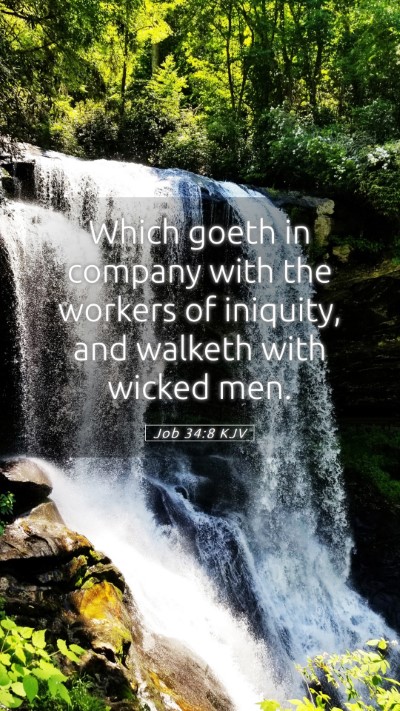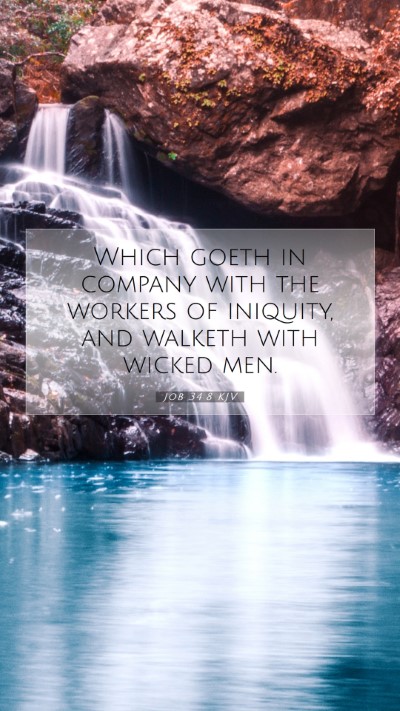Understanding Job 34:8
Verse: "Which goeth in company with the workers of iniquity, and walketh with wicked men."
In this section of Job, the character of the speaker, Elihu, is crucial. This verse discusses the relationship people have with those who commit evil and highlights the consequences of such associations.
Verse Meaning and Context
The verse illustrates the choices individuals make in terms of companionship and moral alignment. Elihu confronts Job about his claims, indicating that Job has aligned himself with those who are unrighteous, highlighting a common biblical theme concerning the influence of companions.
Insights from Public Domain Commentaries
Matthew Henry's Commentary
According to Matthew Henry, this verse signifies the folly of associating with the ungodly. He interprets Elihu's rebuke as a criticism of Job for his perceived injustices and a challenge to his supposed integrity. Henry emphasizes that one must carefully consider the company they keep, as it reflects one's own moral standing and can lead to significant consequences.
Albert Barnes' Notes on the Bible
Albert Barnes elaborates on the phrase "workers of iniquity," describing them as those who engage in actions contrary to God's will. He stresses that walking with the wicked is a choice that carries weight, influencing both behavior and perception among the community. Barnes illustrates the severity of Job's plight, suggesting that despite his righteousness, he must reflect on how his associations may impact his standing before God.
Adam Clarke's Commentary
Adam Clarke provides a critical analysis of Elihu's argument, suggesting that it is steeped in a complex understanding of righteousness versus wickedness. Clarke points out that Elihu's intention is to redirect Job’s focus from his suffering to self-examination regarding his relationships. He highlights that the associations one maintains reflect on their character and accountability before God.
Key Themes and Lessons
-
Choice of Companionship: The verse profoundly underscores the importance of choosing friends wisely. Companionship can either uplift or lead to downfall, echoing scriptures in Proverbs that warn against negative influences (Proverbs 13:20).
-
Moral Integrity: Aligning oneself with the wicked questions one's integrity before God. It encourages readers to reflect on their lives and heed warnings against moral ambiguity.
-
Self-Reflection: Elihu’s challenge prompts Job—and readers alike—to introspect regarding their associations and behaviors. It speaks to the broader theme of personal accountability in one’s spiritual journey (Galatians 6:7).
Cross References
- Proverbs 1:10 - "My son, if sinners entice you, do not consent."
- 1 Corinthians 15:33 - "Do not be deceived: Bad company ruins good morals."
- Psalm 26:4 - "I do not sit with men of falsehood, nor do I consort with hypocrites."
Application to Daily Life
Understanding Job 34:8 encourages believers to interact with the truth in their personal lives. The moral implications are far-reaching in community and individual contexts, leading to deeper insights into one's journey of faith.
Conclusion
This analysis of Job 34:8 combines biblical exegesis and commentary insights, offering a comprehensive understanding of the text. The principles derived from this verse resonate through contexts and interpretations, encouraging an ongoing dialogue in Bible study groups and personal meditation.


